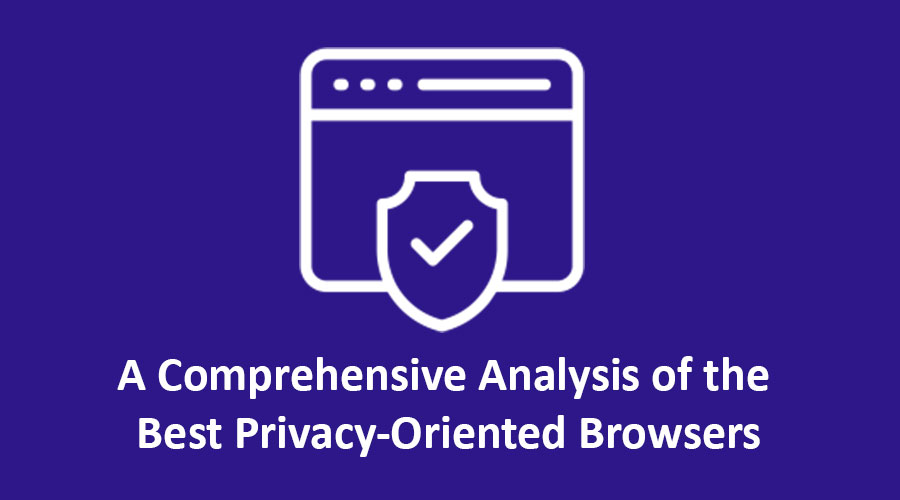
Best privacy browsers in 2023
1. Brave Browser
Brave is a popular browser renowned for its strong emphasis on privacy and security. It offers built-in ad-blocking and tracker-blocking features, which not only enhance user privacy but also improve browsing speed. Brave's Shields feature provides granular control over blocking scripts, cookies, and fingerprinting. Additionally, Brave offers a unique privacy-focused alternative to traditional advertising through its Brave Rewards program, which allows users to opt into privacy-respecting ads in exchange for rewards. The browser also utilizes the HTTPS Everywhere feature, ensuring secure connections when visiting websites.
| Pros | Cons |
|---|---|
| 1. Strong privacy features: Built-in ad and tracker blocking enhance user privacy. | 1. Limited extension support: Compared to other browsers, Brave has a smaller selection of available extensions. |
| 2. Fast browsing speed: Blocking ads and trackers can significantly improve page loading times. | 2. Lack of advanced customization: Brave may not offer the same level of customization options as some other browsers. |
| 3. Brave Rewards: Users can opt into privacy-respecting ads and earn rewards in Basic Attention Tokens (BAT). | 3. Relatively new: As a newer browser, it may have occasional bugs or compatibility issues. |
| 4. HTTPS Everywhere: Ensures secure connections to websites by default. | 4. Limited sync options: Brave's sync functionality is currently limited to bookmarks only. |
| 5. Shields feature: Provides granular control over blocking scripts, cookies, and fingerprinting. | 5. Less mainstream: Brave may have less widespread adoption compared to popular browsers like Chrome or Firefox. |
2. Mozilla Firefox
Mozilla Tracking Protection, which blocks third-party tracking cookies by default. Firefox also offers a comprehensive set of privacy settings, allowing users to customize their privacy preferences to suit their needs. It emphasizes transparency through its open-source nature, making it subject to community scrutiny. Additionally, Firefox regularly updates its privacy features to keep up with evolving threats and privacy concerns. Read more: Firefox privacy: 15 tips for secure and private browsing
| Pros | Cons |
|---|---|
| Strong privacy features | Can be resource-intensive and may consume more memory |
| Customizable with numerous extensions | Some websites may not be optimized for Firefox |
| Open-source and community-driven | Updates can occasionally introduce compatibility issues |
| Enhanced security and regular updates | Syncing across devices can be challenging |
| Built-in tracking protection | Slower compared to some other browsers |
| Cross-platform availability | |
| Developer-friendly tools and features |
3. Tor Browser
For those seeking the highest level of anonymity and privacy, the Tor Browser remains a reliable choice. Built on the Tor network, it encrypts internet traffic and routes it through a series of relays, making it challenging to trace user activity. The Tor Browser also blocks third-party trackers and ensures that cookies and browsing history are automatically cleared when the browser is closed. While Tor may be slower compared to other browsers due to the additional security measures, it offers unparalleled privacy for users who require utmost anonymity.
| Pros | Cons |
|---|---|
| High level of anonymity and privacy | Slower browsing speed |
| Encrypts internet traffic | Limited compatibility with certain websites |
| Routes traffic through relays | Potential for exit node surveillance |
| Blocks third-party trackers | Some websites may block Tor connections |
| Clears cookies and browsing history | Relatively smaller user base |
| Constant development and updates | Can be challenging for inexperienced users |
DuckDuckGo Privacy Browser
DuckDuckGo is a privacy-oriented search engine, and its privacy browser builds upon that philosophy. The DuckDuckGo Privacy Browser blocks third-party trackers, forces encrypted connections, and provides a privacy grade rating for each website visited. It also offers a feature called “Fire Button,” which instantly clears tabs and browsing data. While the DuckDuckGo browser may lack some advanced features found in other browsers, it provides a streamlined and user-friendly interface focused on privacy.
| Pros | Cons |
|---|---|
| Blocks third-party trackers | Limited browser extensions and add-ons |
| Forces encrypted connections | Relatively smaller user base compared to major browsers |
| Provides a privacy grade rating | Lacks advanced features found in mainstream browsers |
| Instantly clears tabs and browsing data | May have occasional compatibility issues with certain websites |
| User-friendly interface | Search results may be less personalized |
| Privacy-focused search engine | May have a learning curve for users accustomed to other browsers |
Waterfox
Waterfox is a browser based on Mozilla Firefox that aims to provide enhanced privacy. It retains many of Firefox's features while offering additional privacy-focused options. Waterfox includes tracking protection, cookie management, and anti-fingerprinting features. It also removes unnecessary telemetry and data collection found in mainstream browsers. Waterfox is particularly suitable for users who value privacy but prefer a familiar browsing experience similar to Firefox.
| Pros | Cons |
|---|---|
| Retains many features of Mozilla Firefox | Limited availability of official support |
| Offers enhanced privacy and security | Smaller user base compared to mainstream browsers |
| Includes tracking protection | May have compatibility issues with certain websites or extensions |
| Provides anti-fingerprinting capabilities | Slower update cycle compared to Firefox |
| Removes unnecessary telemetry and data collection | Less extensive browser extension ecosystem |
| Familiar browsing experience for Firefox users | Limited mobile browser options |
How to enhance your browsers security?
Enhancing the security of your web browser is crucial to protect your online activities and personal information from various threats. Here are some tips to enhance your browser's security:
- Keep Your Browser Updated:
Regularly update your browser to the latest version. Browser updates often include security patches and bug fixes, which help address vulnerabilities and improve overall security. - Enable Automatic Updates:
Configure your browser settings to automatically install updates. This ensures that you receive the latest security patches promptly without having to manually check for updates. - Use a Secure Connection (HTTPS):
Always look for the padlock icon and “https://” in the URL bar when visiting websites. This indicates a secure, encrypted connection, which helps protect your data from eavesdropping and tampering. - Install Security Extensions/Add-ons:
Consider installing reputable security extensions or add-ons for your browser. These tools can provide additional protection against malicious websites, phishing attempts, and harmful downloads. Examples include ad blockers, anti-tracking tools, and script blockers. - Enable Pop-up Blocker:
Activate the built-in pop-up blocker feature in your browser to prevent unwanted pop-ups that may contain malicious content or attempt to deceive you. - Be Cautious with Plugins and Extensions:
Carefully review and limit the number of plugins and extensions you install. Choose reputable sources and regularly review the permissions and access requested by these add-ons. Remove any unused or suspicious plugins to minimize potential security risks. - Disable or Limit JavaScript:
Consider disabling or limiting JavaScript execution in your browser settings, especially for websites that you don't fully trust. JavaScript can be exploited by attackers to deliver malicious code or initiate attacks. - Implement Strong Passwords:
Use unique, complex passwords for your browser and associated accounts. Avoid using common or easily guessable passwords. Consider using a password manager to generate and securely store your passwords. - Clear Browser Data Regularly:
Regularly clear your browser's cache, cookies, and browsing history. This reduces the amount of personal data stored and minimizes the risk of exposure if someone gains unauthorized access to your device. - Be Wary of Downloads and Links:
Exercise caution when downloading files or clicking on links, particularly from unknown or suspicious sources. Verify the credibility of the website or sender before proceeding, as malicious downloads or links can lead to malware infections or phishing attacks. - Enable Two-Factor Authentication (2FA):
Whenever possible, enable two-factor authentication for your browser and associated accounts. This provides an additional layer of security by requiring a second verification step, such as a unique code sent to your mobile device, along with your password. - Use a VPN:
When you connect to a VPN, your internet traffic is encrypted. This means that any data transmitted between your device and the websites you visit is scrambled, making it difficult for hackers or malicious actors to intercept and decipher your data. This encryption provides an added layer of security, especially when using public Wi-Fi networks, where your data would otherwise be more vulnerable to interception.
Remember that while these measures can significantly enhance your browser's security, practicing safe browsing habits and maintaining overall device security are equally important. Stay vigilant, exercise caution when sharing personal information online, and regularly update your antivirus and operating system for comprehensive protection.
Conclusion
Protecting your online privacy is of utmost importance in today's digital age. The browsers mentioned above, including Brave, Firefox, Tor, DuckDuckGo Privacy Browser, and Waterfox, all offer varying degrees of privacy enhancements and security features. Whether you prioritize ad-blocking, tracker-blocking, anonymous browsing, or a combination of these features, selecting a privacy-oriented browser can help safeguard your personal information. Ultimately, the best browser for privacy in 2023 depends on your specific needs and preferences. Stay vigilant, stay informed, and choose a browser that aligns with your privacy priorities for a safer and more secure online experience.
| Privacy Features | Brave | Mozilla Firefox | Tor Browser | DuckDuckGo Privacy Browser | Waterfox |
|---|---|---|---|---|---|
| Ad and Tracker Blocking | Yes | Yes | Yes | Yes | Yes |
| HTTPS Everywhere | Yes | Yes | Yes | Yes | Yes |
| Fingerprinting Protection | Yes | Yes | Yes | Yes | Yes |
| Private Browsing Mode | Yes | Yes | Yes | Yes | Yes |
| Tracking Protection | Yes | Yes | Yes | Yes | Yes |
| Automatic Cookie and History Clearing | Yes | Yes | Yes | Yes | Yes |
| Built-in VPN | Yes (Brave VPN) | No | Yes | No | No |
| Privacy-focused Search Engine Integration | Yes (Brave Search) | No | No | Yes (DuckDuckGo Search) | No |
| Open-source | Yes | Yes | Yes | Yes | Yes |
| Customizable Privacy Settings | Yes | Yes | Limited | Yes | Yes |
| User Base and Community Support | Large and Active | Large and Active | Large and Active | Growing | Smaller and Active |




